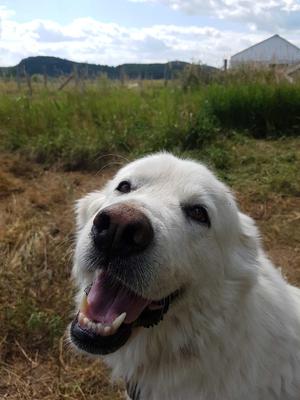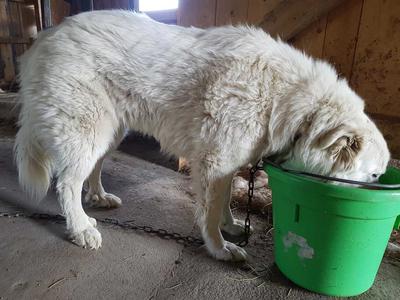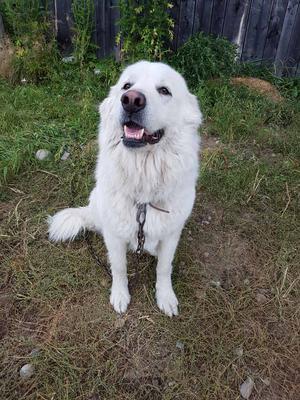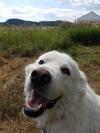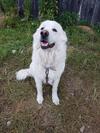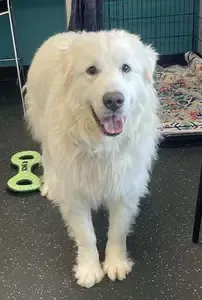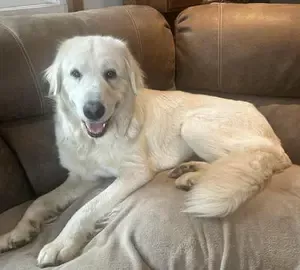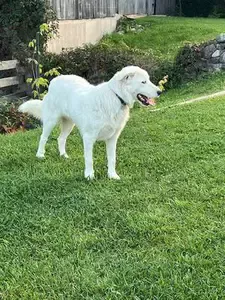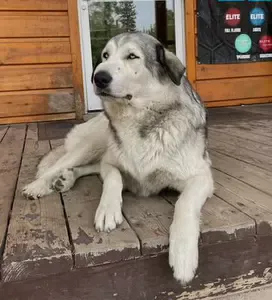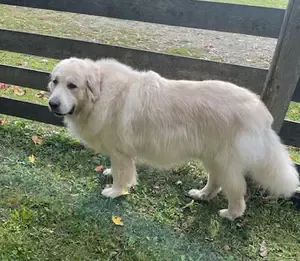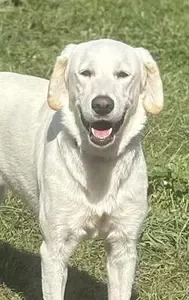Sophie

Sophie has been adopted to a farm where she will continue the job for which the Pyr was bred. It's a small farm so it will be lighter work for her.
Sophie is 3.5 years old. She is currently guarding alpacas. At her previous farm, she was with sheep and horses. She is fine with chickens. She had two litters of pups but now she is spayed.
She is used to working with another Pyr which is how it should be since they need relief from their jobs. She showed positive for heartworm but it is not contagious. She is on interceptor year round and taking antibiotics and to be retested until it's under control. Note that healthy dogs do not make good hosts for parasites.
She is good with cats, kids and adults.
She is not house-trained (she has always lived outside) but this is easily remedied with a routine.
Her people say she would be a good companion dog instead of a working dog. However, they don't see her in a city because of her barking at night. Barking is typical of a Pyr. If you are willing, this is something that can be managed but you have to be ready for it. Daily routine walks and playtime should help this as she matures.
She walks well on leash. She has a tendency to jump on people but, again, with some work she will be fine. She understands ‘sit’.
She is a bit uncomfortable and restless in a car, although she is fine in the cargo area of her car. With increased travelling in the car to good places, this should take care of itself.
In short, here are some of the things to be expected from a Pyr:
They are beautiful dogs with great temperaments given the right breeding, socialization, care including diet and training.
If you want a pup, always talk to a reputable breeder. That is, a breeder whose dogs are registered with a recognized kennel club, who will interview you thoroughly, allow you to see where the dogs live and the pups with their mother. A breeder will only breed their bitches two maybe three times in their lifetime. They will followup with you to ensure you have neutered and spayed.
They require a good weekly grooming with a slicker brush and comb to keep them mat free and their skin healthy (hence, pain free from the pulling of mats as they move), and cutting their nails including their dew claws every couple of weeks to a month.They molt twice a year and all year round so your vacuum stays full. NEVER shave a Pyr. Their double coats keep them cool in summer and warm in winter.
Their instinct it to wander. Therefore, they require at least a 6-foot secure fence in a large yard in which they can play, run and watch over. No tie outs for these guys. It can lead to aggression since they cannot fully watch over their territory. If they are out all day, as they usually prefer, they need shelter from the elements.
They bark more than most dogs and neighbours do complain. That is a common reason for people surrendering their Pyrs (they didn't do their research). Their bark is what deters predators and it is instinct to them. That and marking their territory. To take away their bark is to take away who they are. The barking can be managed but it takes time, patience and consistency with positive-reinforcement training.
They dig holes in your garden to stay cool in summer.
They require a lot of socialization as pups onward with people and other dogs. They also require positive-reinforcement training (a trainer who shows you how to work with a clicker). Pyrs, nor any dogs, take kindly to any kind of punishment. It will lead to aggression.
It's important to work with the dogs as if in a dance and you are leading. Rewards for good behaviour and redirect for unwanted behaviour. It's up to you to make them a good canine citizen. When engaging a trainer, ensure they use positive-reinforcement training and show you how to manage your dog. Never send a dog away for training. You are the one working with the dog, not a trainer.
To train a Pyr is not like training some other dogs. They are not eager-to-please and just as soon walk away from you than do as you say. They have been used for years as guardian livestock dogs because they do not require human intervention to tell them how to do their job. Lots of patience, consistency and time is required to work with them. If you want an obedient dog, this is not the dog for you.
They require regular walks, of course, so they get out and see the world. They must be leashed because they will wander. Again, because they are so good at wandering they have been used to wander with sheep as they watch over them.
There are those in need of a home because someone didn't realize they would get so big, bark so much, leave so much hair in the house, wander, and require work amongst other reasons.
A Pyr is not for most people.
It is very important to do your research on any breed before deciding if they are a good match for your family. Please start here:
Great Pyrenees Club of Southern Ontario
We never want to see these dogs fail so it's important that children learn how to behave with dogs and parents never leave their children alone with a dog. Here is a link on that subject:
Best Dogs for Children
If you think your family is a good match for this pretty girl, please contact Valérie at 819.665.6276.
If you would like to meet Sophie, please complete the adoption application. This will give us more information on you to determine if your family will make a good match.
Return to Post A Happy Tail 2016.
Breaking News
-
Flocon
Feb 22, 26 05:13 PM
DOB: Approx. Jan. 26, 2025 (don’t know for sure) rescued Jan. 2026 Location: Acton, Ontario Maybe this is the boy with whom you an enjoy your life. -
Bo
Feb 10, 26 11:36 AM
DOB: late Sept 2023 (don’t know for sure) rescued Dec 2023 Location: Acton, Ontario Name: Bo Single dwelling home with a securely fenced yard of at -
Courtesy Post - Sarge
Jan 20, 26 01:13 PM
*STAYING IN THE FAMILY* Courtesy Post - Sarge Location: Mount Albert, Ontario DoB: Unknown 2023 Required: He is comfortable around livestock, but -
Hardy
Dec 26, 25 06:23 PM
Hardy Location: Acton, ON DOB: Approx. January 2025 (we think he is older though) Single-family home required. Minimum 5-foot securely fenced yard. -
Ronnie
Nov 22, 25 06:20 AM
*Adopted* Location: Acton, ON DOB: 9-years-old This big sweetheart went to foster and was soon adopted before we got him posted. From the shelter: -
Lola
Nov 19, 25 12:01 PM
*ADOPTED* A single family dwelling and a securely fenced yard of at least 5 feet are musts. DOB approx: Februay 12, 2021 Location: Acton, Ontario This -
Mayne
Nov 07, 25 04:04 PM
*ADOPTED* (FOSTER FAIL) Mayne Location: Acton, ON DOB: August 5, 2017 (8-years-old) Single-family home required. Minimum 5-foot securely fenced yard. -
Courtesy Post - Remi
Oct 17, 25 11:09 AM
*ADOPTED* Remi (Retriever/Pyr cross) D.o.B: Sept. 30, 2023 Location: Between Owen Sound and Port Elgin (Tara, ON) Remi was given up because of health
